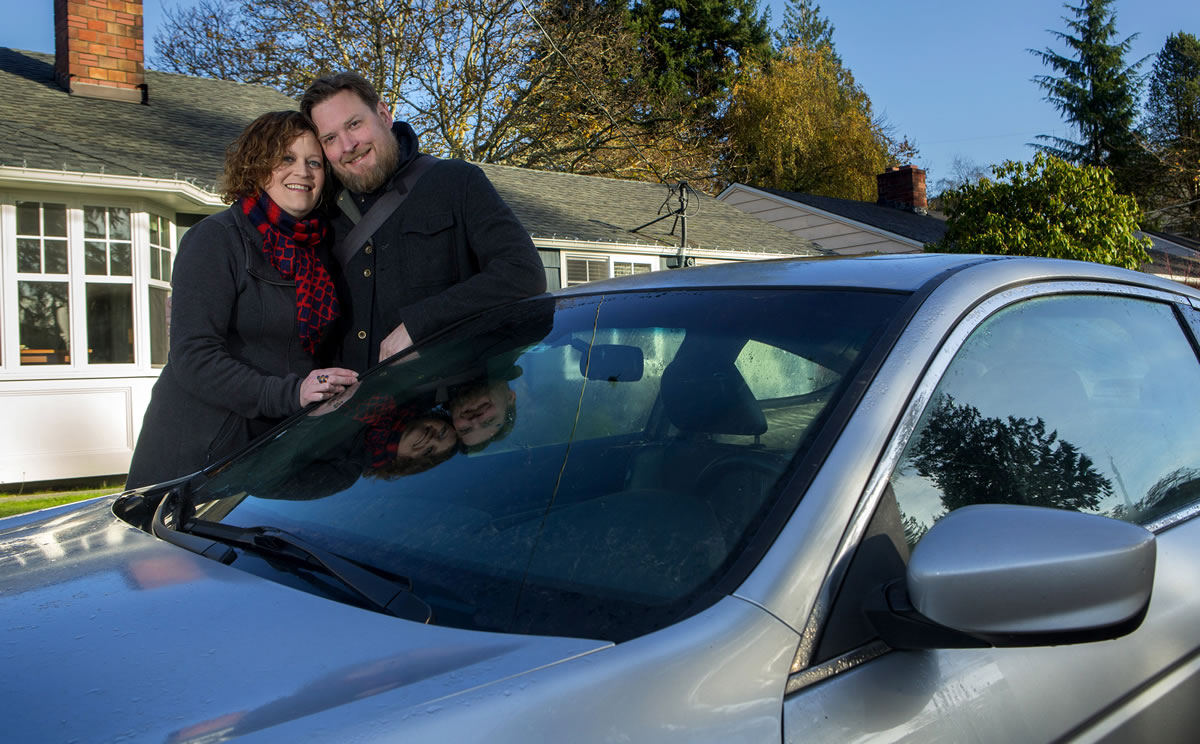SEATTLE — Jeff Vicory and his girlfriend, Lindsey Goodrich, moved to Seattle two summers ago from Lewiston, Idaho, for a taste of city life.
“We moved downtown — all the big buildings and that. It’s mesmerizing for somebody from a small town,” he said.
But living in the big city meant he had to get rid of his truck. He missed driving in the mountains, hunting, chopping wood and camping.
“I came over here and was just trapped downtown for so long. Months and months and months, I couldn’t get away. I was missing the outdoors,” Vicory said.
After investigating car rentals, Zipcar and Car2Go, he found a solution that suited him: Turo, a company that facilitates car rentals from strangers.
Although peer-to-peer car sharing hasn’t grown with the ferocity of Uber or Lyft, the practice has found a niche in the Pacific Northwest that allows tourists and carless locals to explore Mount Rainier’s majesty, walk through the Skagit Valley tulip fields or taste Vancouver, B.C.’s dim sum. And it allows vehicle owners to reap income from cars that might sit vacant otherwise.
• • •
Turo is to cars as Airbnb is to rooms: Owners list their rides on a website and set specific booking times. Renters coordinate an in-person key exchange and hit the road. Turo, which has listings in the Portland-Vancouver area, takes 25 percent of the fee, insures the rental and settles disputes over the condition of the car. The company also contracts roadside assistance should something go wrong during the rental.
Amy King began renting out one of her family’s cars last fall. The full-time Seattle-area mom studied international business and entrepreneurship in college. Whether starting a baby-sitting cooperative or holding trunk show sales for jewelry, she hunts for ways to trim her household’s budget or boost its bottom line.
King uses an SUV for carting her 8- and 9-year-old boys to school and soccer practice, but figured her husband, Roy, could take Microsoft’s company shuttle to work rather than driving the family’s 2009 Honda Accord. In about a year, the family has made more than $1,000 by renting out the Honda via Turo, she said.
“I looked at what it costs my husband to drive to Redmond. It was $5 a day. And that was before the tolls started,” she said, referencing the Seattle-area city where Microsoft is headquartered.
Plus, car sharing serves an ulterior motive. “When he doesn’t take his car, he gets more steps on his Fitbit, and I want him to get exercise,” King said. “He’s aware of my plot to keep him out of his car.”
For King, sharing feels good.
“I really like the efficient use of resources,” she said. “It just seems better for the planet.”
• • •
Unlike Airbnb, Uber or Car2Go, peer-to-peer car sharing hasn’t gone mainstream. Turo was founded in 2009 under the name RelayRides. The company launched in 2010 and came to Seattle in 2012.
At the time, some predicted it would grow quicker than Zipcar and Car2Go.
“If you asked me five years ago, I would have predicted peer-to-peer car sharing would have taken off rather than fleet-car sharing,” said Alan Durning, of Seattle’s Sightline Institute. “If you’re Car2Go, you have to buy cars, maintain and operate them. If you’re RelayRides or now Turo, all you have to do is operate a website.”
Turo did not provide figures about its rental volume, but on a recent search of its website, more than 80 vehicles in the Seattle area were available for an upcoming weekend.
The model has been gaining traction, said Susan Shaheen, who studies mobility and transportation at the University of California at Berkeley.
“What happened since these ideas have been introduced has been a fair amount of experimentation on how to grow this service,” she said.
That’s meant some trial and error. RelayRides recently rebranded as Turo to reflect the company’s shift away from short-term rides.
“It wasn’t worthwhile for owners of vehicles to clean a car out and rent it out for a couple hours. Our growth was coming from travelers wanting to rent the car out for a few days and owners wanting to make more money for less effort,” said Steve Webb, the company’s spokesman. “The name Turo has connotations of travel, gran turismo, adventure.”
Average rentals now last about five days, Webb said.
He was quick to highlight the service’s quirky selection: In the Seattle area, you can rent a Toyota Previa, a Vanagon Westfalia or a Tesla Model S.
• • •
Not every rental goes smoothly.
King said someone smoked in her car once and tried to cover up the smell with an annoying artificial scent. Turo gave her $100 toward a detail for the car.
King said it would be difficult to share her car if she had an “emotional attachment.”
“I think you’ll just worry and be uncomfortable with someone else in your baby,” she said.
• • •
Vicory’s first Turo trip satisfied more than wanderlust. Last summer, he rented a Volkswagen Passat to hike up to Colchuck Lake near the Enchantments with Goodrich (he didn’t know off-road travel violated Turo’s terms).
Neither Goodrich nor the vehicle’s owner knew what he planned.
Once they arrived at the lake, the two hikers “enjoyed the view for a minute up there, and I got down on my knee,” Vicory said. She said yes.
They’ve been renting cars through Turo once or twice a month since.
“It was because of RelayRides that I could get up there and do such an awesome proposal,” Vicory said. “I wanted to be at a beautiful place.”



